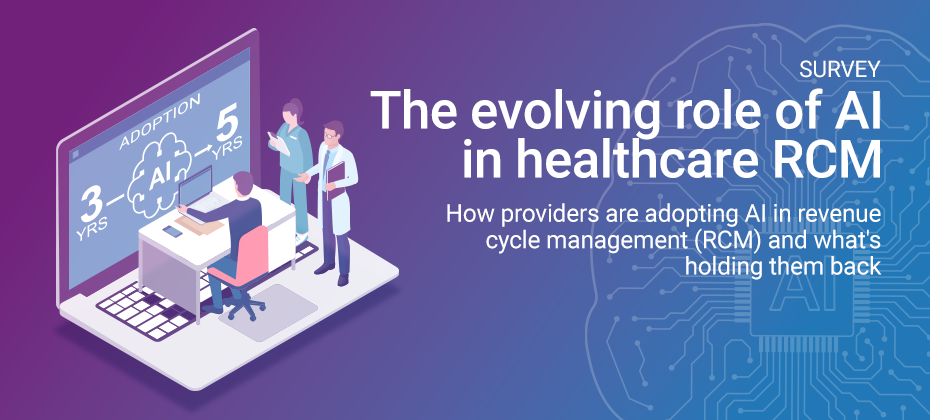Tag: artificial intelligence

Widespread adoption of AI in healthcare revenue cycle management is growing, according to Experian Health’s latest survey. But many providers feel that human oversight still plays a critical role. Discover insights on key trends, use cases and barriers to AI’s evolving role in RCM.

When it comes to artificial intelligence (AI) usage in the healthcare industry, adoption is steadily gaining momentum as providers explore new ways to utilize this technology in their revenue cycle management (RCM) processes. While full trust in AI remains limited, especially for high-stakes decision-making, confidence is rising. Privacy, security, and implementation costs continue to pose significant challenges. However, providers broadly agree that AI will become a cornerstone of healthcare RCM in the next few years, especially in areas like eligibility verification and patient access. Many also acknowledge that human oversight will remain essential, to ensure accuracy and trust. In October 2025, Experian Health surveyed 200 healthcare leaders to better understand how much they trust AI for decision-making, their biggest barriers to adoption, and where the opportunities lie. Here are the results: AI in healthcare RCM isn’t the future; it’s happening now. Learn how healthcare organizations are using Experian Health’s AI technology to streamline patient access and reduce claim denials. Learn more Contact us

AI and automation are transforming the claims management process. By streamlining workflows and minimizing errors, these technologies can help providers reduce denials, enhance operational efficiency and improve patient access to care.

Key takeaways: Manual work and disconnected claims management systems are often error-prone, resulting in delayed and denied claims. Technology, like automation and AI, can help healthcare organizations predict and prevent potential claims issues before submission. Implementing AI-powered claims management solutions should be a top priority for revenue cycle leaders. Healthcare claims denials are on the rise — but so is a new era of technology that can predict and prevent denials before they occur. Leveraging artificial intelligence (AI) for claims management can help organizations break the denial cycle and keep revenue cycles churning. In this article, we’ll explore how solutions like Experian Health’s innovative Patient Access Curator and AI Advantage™ are designed to help providers reduce claim denials with AI. Explore how Experian Health is reshaping the way health systems manage Coordination of Benefits. Learn how automation and AI are eliminating manual errors, reducing denials and unlocking millions in recoverable revenue. Watch now > Updating healthcare claims management tools Claims management is one of the most pressing challenges in healthcare billing. In Experian Health’s 2024 State of Claims survey, 77% of providers said they were moderately to extremely concerned that payers won’t reimburse them, largely due to changing payer policies and prior authorization requirements. Revenue cycle leaders know that good claims management is the key to healthy cash flow and a strong financial foundation. However, with patient volumes growing and complex payer rules increasing, traditional claims management solutions can no longer keep up. As a result, today’s healthcare organizations are feeling the squeeze to update their claims management processes and adopt solutions that rely on automation and AI-powered analytics to better predict, prevent and process denials. Predicting and preventing denials with artificial intelligence Healthcare providers can stop the denial spiral before it begins by capturing accurate and complete patient data at registration. According to Experian Health data, 46% of denials are caused by missing or incorrect information. Now, many healthcare organizations are accelerating their digital transformations by implementing automation and AI tools designed to predict and prevent denials. Automation creates consistent workflows, standardizes routine tasks and reduces human errors. At the same time, AI takes claims management to the next level by predicting denials, flagging claims errors before submission and prioritizing claims that need attention. Leveraging AI solutions that form a closed-loop system can ensure clean data at registration while predicting and preventing denials. Front-end solutions Tools like Patient Access Curator automatically find and correct patient data within seconds — across eligibility, Coordination of Benefits (COB) primacy, Medicare Beneficiary Identifiers (MBI), demographics and insurance discovery. Machine learning and predictive analytics allow providers to identify and correct bad data in real time, without the need for guesswork. Ken Kubisty, VP of Revenue Cycle at Exact Sciences, shares how Patient Access Curator improved eligibility processes, reduced errors and more. Back-end solutions Experian Health’s AI Advantage uses AI and machine learning to predict and prevent denials. AI Advantage not only predicts claim outcomes mid-cycle, but pushes urgent tasks to the front of the queue — allowing staff to prioritize the claims that matter most financially. Extending the automation advantage To minimize denials and delays, providers can look to implement automation and artificial intelligence across the entire claims ecosystem. For instance, Patient Access Curator and AI Advantage integrate seamlessly with solutions that manage the entire claims cycle, like Experian Health’s ClaimSource® — using real-time insights generated by ClaimSource to detect patterns and predict future payer behavior. Additionally, tools like Claim Scrubber can automate the claim scrubbing process — reducing potential errors, administrative burden and the need for costly reworks. Organizations can also add a denials workflow manager to automate and optimize the denial management portion of the claims cycle, improve staff productivity and speed up reimbursement. Artificial intelligence for claims management FAQs Want to learn more about how Experian Health’s AI tools can help reduce and prevent claim denials? Consider these commonly asked questions. What is AI Advantage, and how does it help with healthcare claims management? AI Advantage works in two stages of claims management, with two offerings: Predictive Denials and Denial Triage. In stage one, Predictive Denials uses AI and machine learning to look for patterns in payer adjudications and identify undocumented rules that could result in new denials. This solution also flags claims with a high potential of denial, so the right specialist can intervene before claims go to payers. After a claim has been denied, AI Advantage’s stage two component uses advanced algorithms to identify and segment denials based on their potential value. What is Patient Access Curator, and how does it help reduce claim denials? Experian Health’s Patient Access Curator is a robust patient intake and verification solution designed to eliminate errors that often result in denials, such as missing or incorrect information. Through AI and robotic process automation, Patient Access Curator automatically checks and verifies patient demographic information, insurance details, eligibility and more — reducing claim denial rates and administrative burden. How can AI Advantage and Patient Access Curator work together? Patient Access Curator and AI Advantage form a closed-loop system that offers healthcare organizations a smarter, faster and more scalable way to reduce denials and increase reimbursements while reducing administrative burden on staff. What are real-world results from using these solutions? Case study: Experian Health and Exact Sciences See how Exact Sciences used Patient Access Curator to reduce denials by 50% and add $100 million to their bottom line in six months. Case study: Experian Health and Schneck Medical Center See how Schneck Medical Center used AI Advantage to achieve a 4.6% average monthly decrease in denials. The bottom line: Providers can reduce claim denials with AI Leveraging artificial intelligence for claims management can improve the overall efficiency and accuracy of healthcare claims processing — leading to fewer denials and a more seamless patient experience. Instead of waiting for denials to occur before taking remedial action, healthcare organizations can stay a step ahead with claims management solutions that utilize AI and automation. These tools can help proactively detect errors and diagnose claims process weaknesses for a healthier revenue cycle. As Jason Considine, President at Experian Health, recently shared: “With the power of AI and predictive intelligence, we’re no longer waiting for denials to happen; we’re helping providers proactively prevent them. Tools like Experian Health’s Patient Access Curator and AI Advantage allow healthcare organizations to identify issues at the point of registration and throughout the revenue cycle, so teams can focus on care, not corrections. It’s about working smarter, reducing risk and protecting revenue.” Find out more about how Experian Health’s AI-powered claims management solutions help healthcare providers improve reimbursement rates and reduce denials. Learn more Contact us

Managing claims efficiently—and reducing denials—remains one of the biggest challenges for healthcare providers. Statistics reveal that 46% of denials are caused by missing or inaccurate data, as highlighted by Experian Health's 2024 State of Claims Survey. For providers, these denials translate into endless follow-ups with patients, staff burnout, rising bad debt (which has increased by 7% year-over-year), and slim revenue margins. Reworking a denied claim costs providers an average of $25 and hospitals $181—an expense that is difficult to justify. Introducing Patient Access Curator: Automated claims accuracy from day 1 Fortunately, there is now a way to ensure claims are processed accurately from the start, without excessive effort: Patient Access Curator (PAC), Experian Health's groundbreaking new tool that uses artificial intelligence (AI) to revolutionize the claims process. As a central component of Experian Health's Patient Access portfolio, this innovative solution automates front-end processes, identifies incorrect data upfront, and resolves inaccuracies in real time, preventing costly claim denials before they occur. Introduced in early 2024, the curation tool is getting the attention of revenue cycle leaders at health systems and laboratories, with good reason. This article gives a run-down of Patient Access Curator and how it helps providers prevent claim denials in seconds. On-demand webinar: Reimagining patient access — AI at the epicenter of coordinated benefits management Explore how automation and AI are eliminating manual errors, reducing denials and unlocking millions in recoverable revenue. Built-in AI for more accurate data and seamless claims denial prevention Most issues that lead to denials crop up early in the revenue cycle, when information is missed or captured incorrectly during patient registration. For this reason, it makes sense to focus on denial prevention strategies on the front end. With so much data to capture, manual strategies are bound to stumble. Unfortunately, many digital tools still require staff to check multiple payer websites and data repositories to verify insurance eligibility and check for any billable coverage that might have been missed. Patient Access Curator takes on these tasks seamlessly, and right within Epic workflows. From patient demographics and eligibility checks to coordination of benefits (COB) primacy, Medicare Beneficiary Identifiers (MBI), and insurance discovery, the system automates these essential processes, providing precise data within moments. This solution ensures data integrity from the moment of registration by replacing manual guesswork with advanced AI-driven technology. This reduces the frequency of denials, minimizes A/R write-offs, and curtails vendor fees. Beyond enhancing efficiency, the tool safeguards the financial health of healthcare providers. Jason Considine, President of Experian Health, says, "Our mission is to simplify healthcare. Patient Access Curator's advanced AI technology equips providers to address claim denials more effectively and efficiently than ever before." Say goodbye to manual work with instant eligibility and insurance verification Patient Access Curator simplifies operations for billing teams, healthcare staff and patients. By removing administrative hurdles, staff can focus on patient engagement, rather than spending time on paperwork, phone calls and browsing websites for data. The outcome is improved satisfaction for both healthcare providers and their patients. "We know this technology is revolutionizing the healthcare industry," shares Jordan Levitt, Senior Vice President at Experian Health. Levitt, who developed the AI-powered data capture technology, explains, "By delivering faster, more accurate results, providers can improve financial solvency while giving staff and patients a better experience." Gone are the days of asking patients for insurance cards or verifying numbers and dates that might be inaccurate. With this solution, registrars and billing teams can be confident in the data they collect, right from the start. PAC was created to replace the manual guesswork that often bogs down eligibility and insurance verification processes. From patient demographics and eligibility checks to COB primacy, MBI, and insurance discovery, this solution automates these critical touchpoints, delivering accurate data in seconds. Fewer denials, faster reimbursements The impact on denial prevention is unparalleled. Patient Access Curator ensures fewer claim rejections and faster payer reimbursements by identifying and correcting bad data across eligibility, COB, and discovery at the start of the revenue cycle. Providers are left with more retained revenue, which can be reinvested into what truly matters: patient care. Patient Access Curator: Key features that set it apart Patient Access Curator differentiates itself as a comprehensive, all-in-one product that simplifies the most complex aspects of claims management. Key features include: Real-time data correction: Fixes inaccurate data instantly without staff intervention. Comprehensive coverage: Finds and corrects bad data across eligibility, COB primacy, MBI, demographics, and insurance discovery. Eligibility verification: PAC automatically interrogates 271 responses, flagging up active secondary and tertiary coverage information to eliminate coverage gaps Coordination of Benefits: Integrating with eligibility verification workflow, PAC automatically analyzes payer responses to find hidden signs of additional insurances that may be missed by a human eye, and triggers additional inquiries to those third parties to determine primacy, for faster COB processing Medicare Beneficiary Identifiers: PAC uses AI and robotic process automation to find and fix patient identifiers so no one misses out on essential support Insurance discovery: For patient accounts marked as self-pay or unbillable, PAC automates additional coverage searches Demographics: The platform can quickly check and correct patient contact information. Seamless integration: Automatically updates host systems (Epic) with verified and corrected coverage data in seconds. The results? Fewer clicks, faster workflows, and more accurate billing processes. PAC doesn't just prevent claim denials; it transforms how healthcare teams approach patient access and revenue cycle management. Proven ROI: How Patient Access Curator delivers $100 million boost to Exact Sciences Explore how Patient Access Curator powered a $100M improvement at Exact Sciences by automating insurance discovery and reducing claim denials. Improve financial health by focusing on patient health By eliminating redundant administrative questions, Patient Access Curator allows patients to focus on their health rather than the complexities of billing and coverage. Meanwhile, healthcare staff enjoy a boost in morale, thanks to fewer manual tasks and more efficient workflows—a benefit that can lead to higher staff retention over time. Patient Access Curator is more than a tool; it's a game-changer for healthcare organizations looking to protect their revenue while delivering a better, more seamless experience for both staff and patients. Say goodbye to manual guesswork and hello to a smarter, faster, and more reliable way to manage claims. With PAC, healthcare organizations can finally get claims right from the start, without the hassle. Patient Access Curator is available now - learn how your healthcare organization can get started and prevent claim denials in seconds. Learn more Contact us

Revenue cycle management (RCM) leaders feel it every day: financial pressures continue to mount, with hospital and laboratory operating margin compression becoming a challenge for even the most financially sound healthcare organizations. To combat claim denial pressures and strained lab and hospital profit margins, healthcare providers should start with the beginning in mind. Strained lab and hospital profit margins are particularly evident in revenue cycle operations, where every dollar billed to a payer needs to find its way back to the system. Rising labor costs, increased expenses for purchased services, and declining patient demand - plus inflationary pressures and labor shortages - have exacerbated these issues. As a result, many hospitals and health system leaders are struggling to maintain financial sustainability. The best revenue cycle leaders must deftly navigate a complex mix of denial management strategies and AI-based technology, like Patient Access Curator, to maximize revenue and improve operational efficiency. Payers aren't helping lab or hospital profit margins Payers, facing their own financial pressures, are tightening hospital operating margins even further, leading to increased claim denials, hyper-focused audits, and reduced reimbursement rates. These strategies create a series of cascading challenges for RCM teams, including increased administrative burdens and revenue leakage. According to a report by Healthcare Finance, 84% of health systems cite lower reimbursement from payers as a top cause of low operating margins. Additionally, 82% of CFOs have seen a significant increase in payer denials since pre-pandemic levels. Higher labor costs are another major driver of margin pressure, with 96% of CFOs reporting this as a significant issue. Healthcare leaders agree – strained profit margins are an ongoing struggle In Experian Health's own research, healthcare executives identified strained profit margins as their biggest challenge. The underlying struggle is about money—keeping cash flowing and supporting a healthy organization. One of the country's top health system CFOs stated that it's the first time in his 30-year career where his beds are full, but he has zero margin. This highlights the severity of the issue. Jason Considine, President at Experian Health, says, "We talk to healthcare leaders frequently and our survey and polling have revealed their primary concerns leading to strained margins – and a highly-pressured financial environment. Some of these reasons might be front and center [for a particular organization], others secondary or tertiary. But all of them are driving down margins across health systems: inpatient revenue erosion, cost of labor, rising staffing and supply complexity, delayed payer reimbursements, regulations, and a very fluid, shifting payer mix. It's consistent from system to system, hospital to hospital." Quick fixes only deepen the problem How have most healthcare organizations been playing catch-up? They throw various fixes at the problem, like cobbling together denial management teams, and adding more software, contingency vendors, and labor. However, those solutions can be a knee-jerk reaction, and only compress margins further. Take a look at coordination of benefits (COB) denials. Revenue cycle leaders often don't have the complete data picture when they look at a 271 response to establish primacy and ignore the “noise” of secondary or tertiary payers. Many don't truly know their system's current process for COB denials – nor that of the vendors or staff who try to 'fix' the problems. Bud Zuberer, VP of Sales at Experian Health, says, "On a daily basis we hear that COB denials, contingency fees, and labor costs are crippling revenue cycle teams. They're paralyzed with too many decisions to make. This collection of problems has led to a rise in denial management teams and personnel. We're witnessing the invention of companies to 'solve' the problem. But that's not the answer. The answer lies in ensuring the data ingestion is correct from the start.” Adding more solutions or software to an already full slate of vendors can also be problematic, as it requires more human touchpoints and capital investments. Ultimately, this affects cash flow, cash acceleration, and days in accounts receivable (AR). Prevention is the best medicine to improve strained lab and hospital profit margins The fastest way to ease the pain of rising claim denials and falling cash flow is denial prevention – fixing downstream problems upstream, before they occur. As Zuberer points out, clean data from the start will reduce denials and chasing cash on the back end. Experian Health's all-in-one Patient Access Curator prevents claim denials in seconds by solving bad data quality and real-time data correction, drastically cutting contingency vendor fees and accelerating cash flow. Some of the key benefits of Patient Access Curator include: Reducing billing errors: Artificial intelligence (AI) and machine-learning guided technology improve claim and data accuracy. Quick, accurate patient registration and scheduling: Streamlines processes. Lower denial volumes: Prevents claim denials at the front end. Decrease human resources related to denial management: Eases staffing shortages and frees up team members for higher-value tasks. Client success story Exact Sciences, one of the largest laboratories in the U.S., recently began using the Patient Access Curator in its revenue cycle operations. Thanks to Patient Access Curator, Exact Sciences achieved the following results: 15% increase in revenue per test due to accurate eligibility and fewer denials 4x business volume without increasing headcount 50% reduction in denials and major improvement in timely filings $100 million added to the bottom line in 6 months “You know when Patient Access Curator went live because you can see it in our stock price. It helped us drive a $100 million bottom-line improvement within two quarters.” - Ken Kubisty, Vice President of Revenue Cycle at Exact Sciences Read the full case study or see what Kubisty had to say in a new testimonial: Prevent strained profit margins in the long run Strained profit margins are a significant challenge for healthcare organizations, impacting revenue cycle operations and overall financial health. By adopting strategic approaches and leveraging technology, healthcare leaders can navigate these complexities and confirm every dollar is accounted for. In this evolving landscape, proactive and adaptive leadership is crucial for sustaining financial stability and delivering high-quality care. Learn more about how Patient Access Curator helps prevent strained lab and hospital profit margins by solving for bad data, all at once. Patient Access Curator Contact us

Medical billing errors are common problems that can lead to significant financial losses for healthcare organizations. While most medical billing errors are preventable, outdated systems, complex processes and human errors often result in delayed or denied claims. Faced with ever-increasing overhead costs, workforce challenges and growing volumes of data, healthcare leaders will need to implement modern medical billing software solutions to improve revenue cycle management (RCM) medical billing efficiencies, without adding costly headcount or overhead. This article reviews the role modern medical billing software plays in revenue cycle management and how RCM leaders can use it as a top defense to prevent costly claim delays and denials. What is medical billing software in revenue cycle management? Medical billing software is a critical tool healthcare organizations use to streamline patient billing and collections in revenue cycle management. Revenue cycle leaders know that outdated and complex billing processes can wreak havoc on the entire revenue cycle and waste valuable staff time. However, medical billing in revenue cycle management allows providers to optimize the entire revenue cycle — from pre-visit insurance verification and cost estimates through patient billing and collections. Automated medical billing processes in the revenue cycle can help improve efficiencies, reduce errors, and create more reliable collections processes. This allows healthcare organizations to deliver better patient care while protecting their bottom line. How software powered by artificial intelligence (AI) improves medical billing efficiency AI-powered software helps providers manage many types of complex revenue cycle billing processes — from claims management to collections. Providers that embrace AI often benefit from streamlined medical billing processes, fewer claim denials, real-time eligibility verification, better data insights and productivity boosts. For example, AI-powered software can streamline medical billing by automating repetitive tasks, like insurance verification checks, so providers can prevent and catch errors, speed up reimbursements and stretch strained resources. On the front end, with single-click AI-driven data capture technology, running multiple manual eligibility queries is no longer necessary. Now, with solutions like Patient Access Curator, patient details can be verified quickly and accurately. Patient Access Curator leverages AI and machine learning to automatically handle eligibility verification, coordination of benefits, Medicare Beneficiary Identifiers, insurance discovery and more, with just one click. This saves staff hours and reduces human errors that can lead to claims denials and costly delays later on. Ken Kubisty, VP of Revenue Cycle at Exact Sciences, shares how Patient Access Curator helped their organization reduce claim denial errors and added $75 million in insurance company collections. AI-driven predictive analytics solutions, like AI Advantage™, can also help staff identify claims that may be at risk of denial, so potential issues can be handled before submission — saving even more staff time. When admin overhead is minimized, there's less burnout and less stress. Staff can focus on higher-priority tasks, and healthcare organizations can see productivity increase overall. Preventing claims denials with better billing solutions Claims denials are on the rise with healthcare organizations being left on the hook for delayed or unpaid claims. In the State of Claims 2024 report, 38% of survey respondents said that at least one in ten claims is denied. Some organizations see claims denied more than 15% of the time. That's a lot of cost in reworks and lost revenue. Nearly half of providers say patient information errors are a primary cause of denied claims. Errors are common during pre-visit insurance verification due to error-prone manual processes, but can happen at any point during the collection process. Medical billing software helps providers reduce errors and submit cleaner claims right from the start and catch errors before they become costly problems. Here are some of the key ways medical billing software like Experian Health's Patient Access Curator solution helps providers head off claims denials before they happen. Eligibility checks: Automatically verifies patient eligibility and updates records in real-time to ensure patient information is accurate before claims submission. Coordination of Benefits (COB) verification: Discovers and verifies secondary and tertiary insurance coverage to reduce the risk of COB-related denials while using AI-powered technology to seamlessly integrate with a provider's eligibility verification process. Medicare Beneficiary Identifiers (MBIs): Updates MBIs to confirm patient records are correct and compliant with Medicare requirements while using AI-driven technology and automation to find and correct patient identifiers automatically. Demographics: Patient demographic information is corrected and updated using in-memory analytics and Experian Health's proprietary algorithm to accurately find and fix contact information. Insurance Discovery: Identifies and corrects missing or incorrect insurance information to ensure claims are submitted with the most accurate information available. Discover how Experian Health's revolutionary AI-powered revenue cycle solution is turning denial management into denial prevention. Patient Access Curator solves for missing or correct data in real-time at registration and scheduling, creating a smooth, clean claim process and lowering denials by double digits. Optimize efficiencies in claims management through AI Experian Health customers currently using ClaimSource® can now improve their claim management strategy — before claim submission and after denial. With AI Advantage™ Predictive Denials and Denial Triage, providers can leverage historical claims data and Experian's deep knowledge of payer rules to continuously adapt to an ever-changing payer rules landscape.AI Advantage's - Predictive Denials component reduces denial rates, detects payer changes and empowers staff to focus on highest-priority claims, while AI Advantage's - Denial Triage identifies denials with the highest reimbursement potential and uses AI to segment denials, eliminating guesswork for billers. Watch the video to learn more about the two components that make up AI Advantage, and how healthcare organizations can transform the reimbursement process and decrease claim denials for good. Medical billing software is only getting smarter and faster Upgrading outdated manual medical billing processes results in cleaner claims, improved staff efficiencies, better care and improved patient satisfaction. Today's AI-driven technology brings medical billing in RCM to the next level, enabling time-strapped providers to do even more with less. Now busy providers can streamline manual processes that used to take hours into just seconds. With this new technology, patient information is accurate when claims are submitted, eliminating the need for costly reworks and hits to the bottom line. As more providers adopt AI technology for RCM in medical billing and software solutions get more sophisticated, providers will see new success stories in its power to help healthcare organizations optimize the entire revenue cycle. Learn how tools like Patient Access Curator and AI Advantage can help healthcare organizations prevent claim denials and improve medical billing in RCM. Learn more Contact us

Healthcare claim denials persist as a significant challenge, impacting the efficiency, affordability and timeliness of healthcare delivery and hospitals' financial well-being. They contribute a substantial portion of the staggering $265 billion annual in waste attributed to administrative complexities. On average, hospitals face a yearly loss of $5 million due to healthcare claim denials, amounting to 5% of their net patient revenue, according to the Journal of AHIMA. Yet it appears that the rise in claim denial rates continues unabated. Experian Health's State of Claims 2022 report revealed that 30% of respondents experience medical claims being denied in 10-15% of cases, and 42% confirm an increasing trend in denial rates from one year to the next. There is no question that the claims denial process is ripe for innovation, and that's where reducing healthcare claim denials with artificial intelligence (AI) comes in. Like many other sectors, healthcare providers are slowly but increasingly turning to automation and AI for more accurate data and better insights. The Experian Health survey shows over one-half of healthcare providers turn to AI-driven healthcare claims management software to reduce claim denials. "Adding AI in claims processing cuts denials significantly," Tom Bonner, Principal Product Manager at Experian Health, explains. AI automation quickly flags errors, allowing claims editing before payer submission. It's not science fiction—AI is the tool hospitals need for better healthcare claims denial prevention and management." The current challenges in claims management High patient volumes and complex payer policies Experian Health's 2022 State of Claims survey revealed that reducing denials was a top priority for almost three-quarters of healthcare leaders. Why? High patient volumes mean there are more claims to process, and changing payer policies and insurance coverage compound an already overwhelming problem. An Sg2 report predicts that patient volume issues will continue over the next decade, with inpatient hospital volumes growing by 2%. This rise in patient numbers will require more data for claims management processing. Hospitals, often short-staffed, will have to allocate more resources to ensure claim approval and increase efforts to address claims denial. In addition to managing increasing patient volumes, keeping track of changing payer coverage and requirements has always been challenging for providers. The inconsistency of these payer rules and communication problems exacerbate the situation. Healthcare providers may need efficient solutions to keep up with these rule changes or allocate more time and resources to addressing and revising claims. Labor shortages and financial pressures According to a data brief from the American Hospital Association, the increasing rate of clinician burnout, the enduring effects of COVID-19, and ongoing strains on the healthcare workforce are compelling hospitals to recognize and tackle chronic labor shortages. Notably, 80% of healthcare leaders acknowledge that chronic staffing shortages present significant risks for their organizations. Increasing denial rates is one way these risks manifest. As the State of Claims 2022 report confirms, 30% of respondents mentioned staffing shortages significantly contribute to healthcare claim denials. Additionally, Experian Health's recent survey, Short Staffed for the Long-Term, which investigated the impact of healthcare staffing shortages, found that 70% of respondents facing staff shortages also experienced increasing denial rates. Labor shortages mean fewer hands on deck to deal with the claims processing workload, while financial pressures on hospitals mean the stakes are higher than ever to solve the problem of claim denials. Limitations and costs of manual claims processes Health payers deny hospital systems about $260 billion worth of inpatient claims annually. According to Experian Health's survey, manual processing and a lack of automation are the primary reasons for these medical claim denials. The State of Claims 2022 report found that 61% of respondents do not automate claims submission and denial prevention processes, leaving them to rely on manually processing claims. However, manual claims management tools simply cannot keep up with the complexities and data-intensive nature of claims processing. When claims processes are handled manually, healthcare workers are burdened with cumbersome tasks that could have been automated, there is a higher risk of errors that lead to claims denial, and there'll be more need to dedicate extra time and effort to appeal denied claims. These intensive steps necessary for manual claims processing drain staff resources and create opportunities for money and time waste that are eventually detrimental to the hospital's financial circumstances. How AI and automation address healthcare claim denials Automation and AI can ease the pressure by processing more claims in less time. They give providers better insights into their claims and denial data so they can make evidence-based operational improvements. AI tools achieve this by using machine learning and natural language processing (NLP) to identify and learn from data patterns and synthesize huge data swathes to predict future outcomes. While AI is ideal for solving problems in a data-rich environment, automation in claims processing can complete rules-based, repetitive tasks with incredible speed and reliability that a person might not achieve. By using automation and AI in claims processing, healthcare providers can gain better insights into their claims and denial data, resulting in improved financial performance and greater efficiency. Tom Bonner says, "AI in healthcare claims processing maximizes the benefits of automation for better claims processing, better customer experiences and a better bottom line for healthcare providers." However, the pace of AI adoption is somewhat slower in healthcare due to legacy data management systems and data silos. As efforts to improve interoperability progress, providers will have more opportunities to deploy AI-based technology. This prediction is already evident in claims management, where executives are keeping an ear to the ground to learn of new use cases for reducing claim denials with AI to help maximize reimbursements. Key benefits of AI in healthcare claims management Healthcare claims management upgraded with the inception of AI-driven healthcare claims management software exponentially benefits claims management through its predictive, accuracy, and error-reduction capabilities. Predictive Analytics and Pattern Recognition: The benefits of AI in healthcare claims processing lie in the ability of AI-driven solutions to predict potential issues before they occur by analyzing claims and providing a probability of denial that allows the end user to intervene and determine the appropriate collection. AI can analyze patterns in historical claims data to predict future volumes and costs, so providers can plan accordingly without simply guessing at what’s to come. Error Reduction and Clean Claim Submissions: AI can also assist in identifying inaccurate claims and improve claims processing accuracy to ensure clean claim submission and efficient revenue cycle management. Case studies and real-world applications AI and automation in claims processing are helping healthcare providers overcome the challenges contributing to increasing claim denial rates. Experian Health's AI-driven and automation solutions, like AI Advantage™, enable clients to benefit from the full potential of AI and automation to minimize claim denials. How Community Medical Centers uses AI Advantage to predict and prevent healthcare claim denials Community Medical Centers (CMC), a non-profit health system in California, uses Experian Health's new solution, AI Advantage, which uses AI to prevent and reduce claim denials. Eric Eckhart, Director of Patient Financial Services, says they became early adopters to help staff keep up with the increasing rate of denials, which could no longer be managed through overtime alone. "We were looking for something technology-based to help us bring down denials and stay ahead of staff expenses. We're very happy with the results we're seeing now." AI Advantage reviews claims before they are submitted and alerts staff to any likely to be denied based on patterns in the organization's historical payment data and previous payer adjudication decisions. CMC finds this particularly useful for addressing two of the most common types of denials: those denied due to lack of prior authorization and those denied because the service is not covered. Billers need up-to-date knowledge of which services will and will not be covered, which is challenging with high staff turnover. AI Advantage eases the pressure by automatically detecting changes in how payers handle claims and flagging those at risk of denial so staff can intervene. This reduces the number of denials while facilitating more efficient use of staff time. Eckhart says that within six months of using AI Advantage, they saw 'missing prior authorization' denials decrease by 22% and 'service not covered' denials decrease by 18% without additional hires. Overall, he estimates that AI Advantage has helped his team save more than 30 hours a month in collector time: "Now I have almost a whole week a month of staff time back, and I can put that on other things. I can pull that back from outsourcing to other follow-up vendors and bring that in-house and save money. The savings have snowballed. That's really been the biggest financial impact." How Providence Health found $30M in coverage and reduced denial rates with automated eligibility checks Providence Health is a prominent health system with 56 hospitals and over 1,000 physician clinics, serving an annual patient volume of over 28 million. This magnitude of patient volume created greater issues with slow and manual payer eligibility processes and increased eligibility denials. Furthermore, in response to Epic's growing payer plan table, Providence Health sought an effective solution to merge and organize data on insurance plans, contracts, and reimbursement details and automate eligibility tracking within the system. Their search led them to Experian Health's Insurance Eligibility Verification solution. According to Emily Brown, Director of Operation Excellence, "Our search for a solution that seamlessly integrates with Epic led us to choose Experian as our preferred vendor, given their proven track record of working with Epic." Providence Health implemented Experian's Eligibility solution, including a Bad Plan Code Detection tool to catch coding errors before submission. The solution also allowed them to stay connected to over 900 payers and provide backup connectivity to over 300 additional payers for uninterrupted service. The solution's automated work queues also helped staff work more efficiently. Providence reduced denial rates, saving $18 million in potential denials in 5 months of implementing Experian's Eligibility solution. The tool also helped them find $30 million in coverage annually while reducing staff workload. How Schneck Medical Center prevents and triages denials with AI Advantage™ Schneck Medical Center delivers care to four counties in Indiana, supported by a team of over 1,000 employees, 125 volunteers, and close to 200 physicians. According to Skylar Earley, Director of Patient Financial Services, "The challenge we (Schneck Medical Center) sought to overcome by leveraging AI Advantage at our organization was just gaining more insight into how denials originate and what actions we can take to prevent those from happening." Schneck Medical Center collaborated with Experian Health to implement: AI Advantage™ — Predictive Denials and AI Advantage™ — Denial Triage. They aimed to use these tools to identify claims that were more likely to be denied so that the appropriate personnel could address them and clean them before sending them to payers. They also wanted to be able to identify and prioritize denials with the potential for revenue reimbursement that will impact their bottom lines. AI Advantage™ — Predictive Denials enabled team members to make informed and timely decisions before submitting claims. In the first six months of using the tool, Schneck achieved a 4.6% average monthly decrease in denials. The time spent on denials decreased by 4x, and flagged claims were resolved in 3–5 minutes rather than the previous 12–15 minutes per correction. With AI Advantage — Denial Triage, billers were able to redirect their effort on denials more likely to be reimbursed. This prioritization enables them to avoid wasting time on high-dollar claims that are unlikely to be paid. "We had no insight into whether we were performing value-added work when we followed up and worked denials. Now we see those percentages," says Skylar Earley, Director of Patient Financial Services Steps to implementing AI in claims management AI Advantage works in two stages in claims management, reducing claims denial and addressing denied claims to prioritize those with the best value for reimbursement. Stage One: Predictive Denials Stage one is Predictive Denials, which uses machine learning to look for patterns in payer adjudications and identify undocumented rules that could result in new denials. As demonstrated by CMC and Schneck Medical Center, this helps providers prevent denials before they occur. Stage Two: Denial Triage Stage two is Denial Triage, which comes into play when a claim has been denied. This component uses advanced algorithms to identify and segment denials based on their potential value so staff can focus on reworking the denials that will impact their bottom line. Enhancing revenue cycle management with AI Embracing integrated workflows uncovers novel applications for reducing healthcare claim denials with AI and automation. AI Advantage seamlessly works within ClaimSource®, which means staff can view data from multiple claims management tools in one place. These integrations amplify the benefits of each tool, giving healthcare providers better insights into their claims and denial data. With richer data, organizations will find new ways to leverage AI to increase efficiency, reduce costs and boost revenue. Key differentiators In addition to its AI solutions, Experian Health offers solutions that automate claims processing to facilitate claims management and increase efficiency. ClaimSource® helps providers manage the entire revenue cycle by creating custom work queues and automating reimbursement processing. This intelligent healthcare claims management software ensures clean claims before they're submitted, helping to optimize the revenue cycle. The software generates accurate adjudication reports within 24 to 72 hours to speed up reimbursement. ClaimSource ranked #1 in Best in KLAS 2024, for its success in helping providers submit complete and accurate claims. This tool prevents errors and helps prepare claims for processing. Because the claims are error-free, providers can optimize the reimbursement processes and get their money even faster. Another Experian Health solution, Enhanced Claim Status, improves cash flow by responding early and accurately to denied transactions. This solution gives healthcare providers a leg up on denied, pending, return-to-provider, and zero-pay transactions. The benefits include: Provides information on exactly why the claim was denied Speeds up the denials process Automates manual claims follow-ups Integrates with HIS/PMS or ClaimSource Automation frees up staff to focus on more complex claims Denials Workflow Manager integrates with the Enhanced Claim Status solution to help eliminate manual processes, allowing providers to optimize claims submission and maximize cash flow. Using AI and automated solutions to prevent healthcare claim denials There's no question that healthcare claims denials management is an unwieldy, time-consuming, and ever-changing process. Reimbursement is complex, but human error plays a large part in missed opportunities and lost revenue. The revenue cycle becomes seamless with AI and automation in healthcare claims management. Any healthcare provider seeking faster reimbursement and a better bottom line knows that improving claims management is critical to better cash flow. AI and automation-driven claims management software offers healthcare organizations a way to achieve these goals. Contact Experian Health today to prevent healthcare claim denials and improve your claims management process with AI Advantage and other denial management solutions.

What do patients and providers really think about patient access services in 2024? Drawing insights from more than 1000 patients and 200 healthcare executives, Experian Health's fourth State of Patient Access survey pulls back the curtain. Previous surveys revealed a persistent gap between patient and provider perspectives on patient access, but could the gap finally be closing? The State of Patient Access 2024 report suggests that while discrepancies remain, the two groups appear closer than ever. This article provides a summary of the State of Patient Access 2024 report, and gives a run-down of patient and provider perspectives on patient access, what they see as top challenges, where opinions diverge and the steps providers can take to continue building a positive patient access experience in the year ahead. How do patients feel about patient access? 1. More patients think access has improved compared to last year 28% of patients believe patient access has improved over the last year, which is up from just 17% in 2023. As in previous years, patients' perception of whether access has improved hinges on how quickly they can see their doctor. Anything providers can do to accelerate scheduling and registration will be a winner. 2. Patients welcome the efficiency and accuracy of digital tools Patients have noticed improvements in scheduling and registration processes. They welcome the ability to book appointments anytime and avoid unnecessary paperwork using digital technology. That said, financial considerations trump convenience: the ability to look up insurance coverage and obtain accurate price estimates before care have risen to the top of the list of what patients consider the most important aspects to improve. 3. Cost of care remains a concern Unfortunately, patient sentiment around healthcare payments has remained relatively flat since 2022. Slightly more patients are receiving upfront cost estimates compared to previous years, but accuracy appears to have dropped, with 74% of patients reporting accurate estimates compared to 78% in 2023. Patients must have faith in their estimates if they are to plan for upcoming bills with confidence, and providers should be able to provide transparent and accurate payment estimates. What do providers think about patient access? 1. Providers are again more optimistic about improvements than patients Like patients, providers are generally positive about the state of patient access, though they may be a little too optimistic about the effect of improvement efforts. Around twice as many providers think access is better than the previous year compared to patients (55% compared to 28%). For providers, perceptions of improvements in patient access are closely tied to the impact of staffing levels. 2. Self-scheduling is back in favor Providers are aligned with patients on the need for digital scheduling and registration options. Interestingly, after the urgency to implement contactless scheduling during the pandemic began to wane in 2022, the latest survey suggests that self-scheduling is back in fashion, with 63% offering self-scheduling compared to 40% in 2022. 3. “Dirty data” remains a stubborn challenge Data collection at patient intake is a persistent headache for providers. Almost half (49%) say that inaccurate patient information contributes to claim denials. Improving the speed and accuracy of resolving patient information prior to claims submission were frequently listed in providers' top three challenges. See how healthcare organizations are using AI AdvantageTM to improve data accuracy and reduce claim denials. Digital technology bridges the gap between patient and provider perspectives on patient access When asked for their top three priorities for improvement, both groups ranked accurate price estimates and efficient insurance verification among their top two. While they diverge on the third – access to online health management tools for patients, and automated pre-authorizations for providers – it's interesting to note that these both reflect a desire to use digital solutions for greater efficiency and convenience. The survey highlights several opportunities to use digital technology to address upcoming challenges and continue to close the gap. Key challenges in patient access in the year ahead 1. Improving accuracy of upfront price estimates The survey showed 79% of providers plan to invest in patient access improvements soon. Given shared concerns about patients' ability to cover the cost of care, and worrying hints that some may postpone care due to cost concerns, prioritizing and providing accurate patient estimates would be a smart choice. While patients and providers are in closer agreement that estimates are accurate most or all of the time (74% and 85% respectively), there's clearly room for improvement. 2. Accelerating insurance verification and claims submission processes Several of the providers' top challenges speak to how difficult it can be to collate accurate information prior to claims submission. The need for better insurance reviews, more efficient management of prior authorizations, and more accurate patient information all contribute to the overarching goal of getting properly reimbursed. Almost a fifth say that managing multiple tools to determine eligibility, coordination of benefits (COB), and other pre-service checks is a top challenge. Could a single solution be the answer? Experian Health's new Patient Access Curator solution checks eligibility, COB, Medicare and commercial coverage, demographics and financial status in less than 30 seconds. Staff can check off several of these tedious tasks with just a single click. 3. Bolstering workforce capacity with technology A final challenge in the year ahead is the ongoing impact of staffing shortages. For the of providers who feel that staffing levels are disrupting delivery of scheduling and registration services, technology may offer a way through. Automation and artificial intelligence not only reduce the burden on staff by eliminating time-consuming manual tasks, but also allow staff to work smarter and faster on remaining tasks by improving data accuracy and insights. Most importantly, digital technology can improve scheduling, registration and payment processes for patients – and bring the patient experience in line with what both groups aspire to see. Download the full report: State of Patient Access 2024, or contact Experian Health to learn how technology can help streamline patient access.